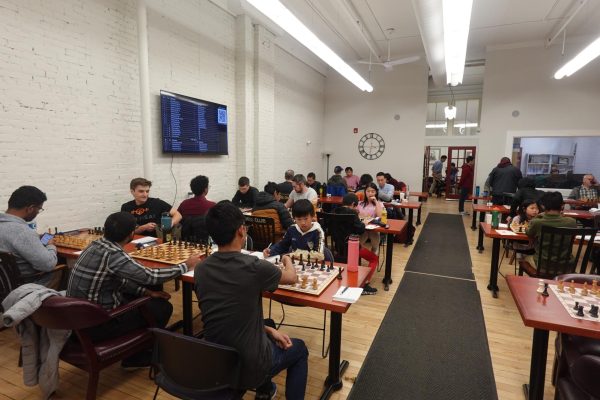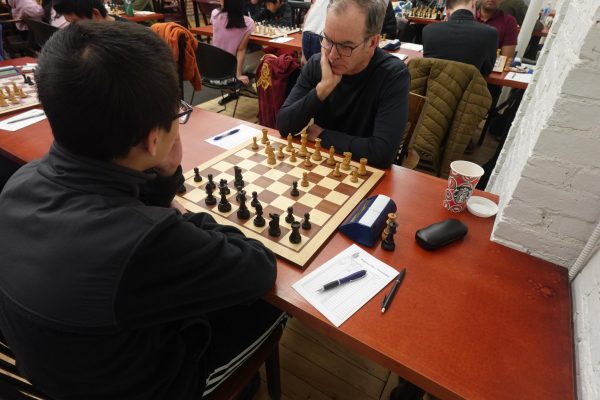Marked by only a plain sign hanging from an even plain-er building, there lives a strong-standing testament to the growing game of chess. Upon entering, there is one room for spectators to snack and socialize while watching the most locked-in competition, from windows overlooking the second room with rows and rows of checkered tables. It is so quiet you could hear a pin drop.¬Ý
Less than a 15-minute walk from the Boston Common, the Boylston Chess Club is a local hub for players of all skill levels to immerse themselves in the game’s community.
This is a classical chess tournament. It is part of the club‚Äôs three-day Fall Festival and features a grand prize of $4,000 for the winner. It’s one of two premier events that the club hosts in addition to weekly Tuesday and Thursday tournaments and other smaller weekend tournaments throughout the year.

The Boylston Chess Foundation is a long-standing organization of Massachusetts chess that celebrated its 100th anniversary back in 2019. The club, run by lifelong chess player Andrew Hoy, has survived and thrived through many struggles in recent years. They have moved multiple times since their start on Boylston Street, most notably from Davis Square to Cambridge, and are now based downtown.¬Ý
In the past, the club often shared spaces with other organizations, making it difficult to schedule events. Recently, chess has grown in popularity and the Boylston Chess Club wanted to accommodate everyone while still keeping within the financial constraints that came with being a nonprofit organization.¬Ý
“Moving was definitely a big challenge,” Hoy said.
“Especially during the pandemic, [chess] took off a bunch and it was hard to find a space that kept up with the demands,” said Hoy. “We spent three years looking at pretty much every commercial property that came on the market.”
Despite this, they found and now own their current location at 35 Kingston Street. It is a spacious alternative to their previous spaces that is “much nicer for everyone,” according to David Katsman, one of the chess players who has seen the different locations throughout the years.

While this club is one of many local chess hubs, it is a favorite of competitive chess players. Tournaments like the Fall Festival are geared to “recruit more players who are really strong,” according to one of the tournament directors and lifelong chess player Justin Guerra. He says they have two or three GMs, chess grandmasters. Guerra describes this title as the “highest title in chess which is internationally renowned and very coveted.”
For example, Carrisa Yip, who has won the U.S. Women’s Chess Championship three times, used to play chess at Boylston frequently.
Still, the club maintains that it is welcome to chess players of all skill levels. In tournaments, they grade chess players on a point scale and “try and pair the same people with the same score,” said Steven Gradijan, who directs tournaments throughout the week.
Small children often play against seasoned chess players and grown adults, which is common in the chess world.
One such young player is Christine Nguyen, who is 11 years old. She says she likes learning from playing against people older than her.¬Ý
‚ÄúI feel like it’s a good experience and it’s interesting to see how they play,‚Äù said Nguyen.
Though the club does not hold classes, Guerrara says they still find “teachable moments for everybody to learn” hoping to build a welcoming space for all chess players.
Andrew Hoy continued to state one of the main goals of the club, which is to make sure that everybody who’s interested in trying out chess can get a chance to come play.¬Ý
“[We want them to] see how they do, and meet other chess players,” Hoy said.